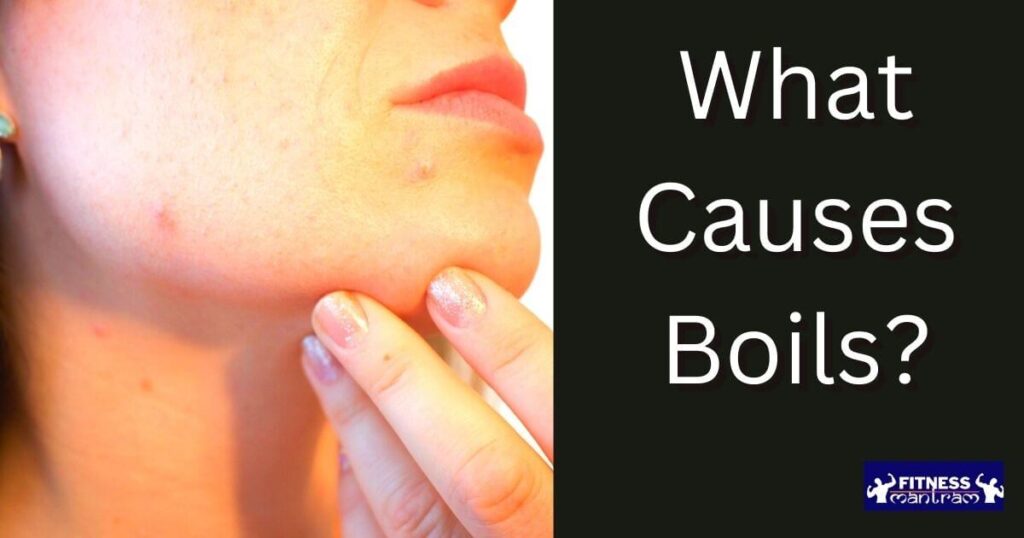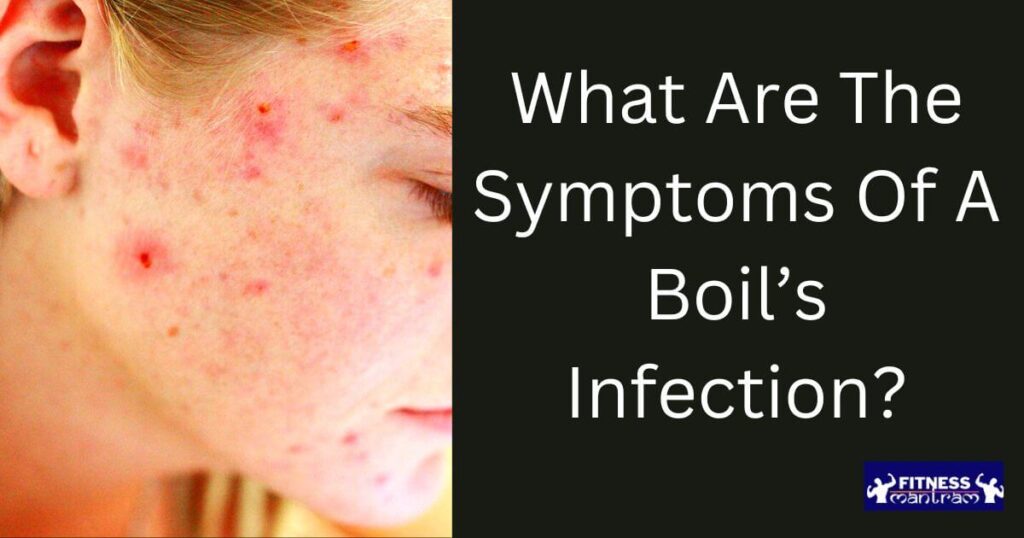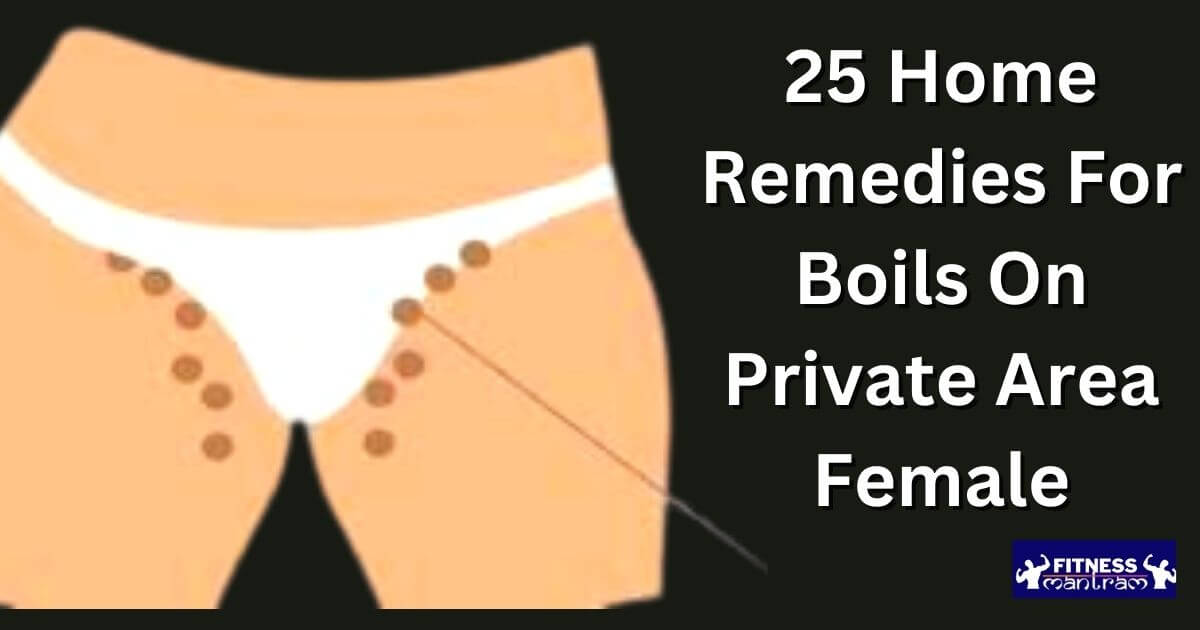Introduction
What Are Boils?
Boils are skin infections caused by bacteria invading an oil gland or hair follicle. They appear as a red, swollen, and sensitive bump on the skin. The pus-filled bump develops a white or yellow head over time. Boils can occur anywhere on the skin, but the face, neck, armpits, and buttocks are the most common locations.
The majority of boils are brought on by Staphylococcus aureus bacteria. Poor hygiene, a weakened immune system, and damaged skin are all risk factors for boils. To prevent further infection, it is essential to keep the affected area clean and refrain from picking at it if you have a boil. A medical professional may need to drain boils in some instances.
What Causes Boils?

Bacterial infections of the skin’s oil glands or hair follicles are what cause boils. Most of the time, they happen when bacteria like Staphylococcus aureus get into the skin through a cut, scrape, or other skin break. This may result in the development of a boil and an infection in the skin’s deeper layers. If you see any similar symptoms of a boil, it is essential to maintain good hygiene and seek medical attention to ensure proper treatment and the prevention of infection spread.
Factors That Can Increase The Risk Of Developing Boils
1.Hygiene issues: Poor hygiene can make it more likely that you’ll get a boil because bacteria thrive in warm, moist places.
2.Insufficient immune system: Boils are more common in people who have diabetes or HIV/AIDS, both of which weaken the immune system.
3.Skin-to-skin proximity: Through close skin-to-skin contact, boils can spread from person to person and be contagious.
4.Removal of hair: When the skin is broken or irritated, shaving, waxing, and other hair removal methods can make it more likely that boils will form.
5.Pressure or friction: The skin can become more susceptible to developing boils in certain areas if tight clothing is worn or heavy bags are carried.
What Causes Vaginal Boils?
An infection of the vaginal hair follicles or sweat glands typically results in vaginal boils, which are also known as vaginal abscesses. They can be brought on by a wide range of bacteria, including Staphylococcus aureus, but the most common one is Haemophilus vaginitis, a bacteria that can spread through sexual contact.
If you are having the said symptoms of a vaginal boil, such as pain, swelling, or discharge, it is essential to maintain good hygiene and seek medical attention to receive the appropriate treatment and prevent the infection from spreading.
Things That Can Make More Likely To Get Vaginal Boils
1.Hygiene Issues: When people don’t change their tampons or pads enough, for example, they can create an environment where bacteria can thrive and cause an infection.
2.Sexual Behavior: If there are cuts or abrasions in the vaginal area, having sex can increase the risk of vaginal boils.
3.Menstruation: Due to the increased moisture and bacteria in the vaginal area, women who are menstruating may be more likely to develop vaginal boils.
4.Skin Conditions that persist: Vaginal boils may be more common in women who have eczema or psoriasis, both of which are chronic skin conditions.
5.Insufficient Immune System: Vaginal boils are more common in women with weakened immune systems, like those with diabetes or HIV/AIDS.
What Are The Symptoms Of A Boil’s Infection?
A skin abscess, also known as a boil, is a localized infection that occurs deep within the skin. In order to receive appropriate treatment and prevent the infection from spreading, it is critical to seek medical attention if you experience any of these symptoms.

Common signs and symptoms of a boil include:
1.Tenderness or pain: The boil may ache deeply or be painful to touch.
2.Redness: Over the boil, the skin may turn red, swell, and become inflamed.
3.Swelling: The boil may become larger, more tender, and more swollen as the infection progresses.
4.Formation of a pimple or bump: A pimple-like-sized, firm bump may appear. As the infection progresses, the bump may develop pus.
5.Drainage: The boil may eventually burst, releasing pus and blood.
How To Get Rid Of Vaginal Boils?
If you are going through the symptoms of a vaginal boil, you should see a doctor right away because self-treatment may not be effective and may even make the infection worse. Your doctor will be able to figure out what’s causing the boil and will give you the right treatment to get rid of it.
Vaginal boils can usually be treated with antibiotics, either orally or topically. If the abscess is particularly large or is causing a lot of pain, your doctor may also suggest draining it. You can manage and treat vaginal boils by taking the following steps:
1.Maintain cleanliness: To reduce the likelihood of contracting a second infection, make sure the vaginal area is dry and clean, and change sanitary pads or tampons frequently.
2.Prevent irritants: Use gentle soaps, douches, and other products that could irritate the vaginal area and aggravate the boil.
3.Take the antibiotics as directed: Even if the boil has improved, if antibiotics are prescribed, it is essential to take them as directed and complete the treatment.
4.Warm compresses can help: Warm compresses can help ease pain and swelling in the affected area.
5.Avoid having sex: When you have a vaginal boil, you should not have any sexual contact because doing so can spread the infection and delay healing.
6.Maintain a covered area: To reduce the likelihood of acquiring a second infection, cover the affected area and wear loose, breathable clothing.
Best Antibiotic For Boils
It is critical to take your antibiotics according to your doctor’s instructions, not according to the information provided here below in this article . Even if the boil has diminished, it is still critical to complete the treatment. This will assist in ensuring that the infection is completely eradicated and preventing the growth of bacteria that are resistant to antibiotics.
It is also essential to keep in mind that not all boils require the use of antibiotics, and in some instances, the boil may subside on its own without the need for treatment. The root of the boil will be identified by your doctor, who will also be able to recommend the most effective treatment for you.
The most effective antibiotic for boils is determined by the underlying cause of the infection. Since Staphylococcus aureus is the most common bacterium that causes boils, antibiotics that kill this kind of bacterium can treat most boils. The following are some common antibiotics used to treat boils:
1.Dicloxacillin: This is an antibiotic of the penicillin type that is frequently used to treat boils and other skin infections.
2.Cephalexin: Another antibiotic of the penicillin family is frequently used to treat boils and other skin infections.
3.Clindamycin: This kind of antibiotic is effective against a wide range of bacteria and is frequently used to treat skin infections like boils.
4.Antibiotics for Methicillin-resistant Staphylococcus aureus (MRSA): Your doctor may prescribe MRSA-specific antibiotics like vancomycin or linezolid if a boil culture reveals that the bacteria are resistant to the above antibiotics.
25 Home Remedies For Boils On Private Area Female
It is essential to keep in mind that these treatments are not meant to take the place of medical care. Genital boils can be unpleasant and embarrassing, so, If your symptoms do not go away or get worse, you should talk to a doctor. However, the following 25 home remedies for female boils in the private area may help alleviate the symptoms
1.Maintain a dry and clean environment by regularly washing the area with warm water and soap to help heal and prevent infection.
2.Applying a warm compress can help bring the boil to a head, alleviate pain, and speed up the healing process.
3.Use tea tree oil: The antiseptic properties of tea tree oil can help lower the risk of infection.
4.Apply a mixture of turmeric and honey. Because honey is antibacterial and turmeric is anti-inflammatory, this is a potent combination for treating boils.
5.Use garlic as a home remedy for boils because it has antiseptic and antimicrobial properties.
6.Use a mixture of castor oil and baking soda to treat boils. Castor oil has anti-inflammatory properties, and baking soda can help balance the pH of the skin.
7.Epsom salt can be used to reduce swelling and speed up healing.
8.Use a vinegar-and-salt solution to treat the boil. Because vinegar has antiseptic properties and salt can help dry out the boil, this combination works well.
9.Aloe vera can be used to treat boils at home because it has anti-inflammatory and moisturizing properties.
10.Apply a mixture of cinnamon and honey. Because cinnamon and honey both have antiseptic properties, this is a potent combination for treating boils.
11.Use a paste made of baking soda. Baking soda can help balance the pH of the skin and reduce inflammation and itching.
12.Apply a mixture of honey and lemon juice. The combination is potent for treating boils because honey is antibacterial and lemon juice is antiseptic.
13.Use a warm chamomile tea bag to soothe skin and speed up healing. Chamomile has anti-inflammatory properties.
14.Witch hazel can help reduce swelling and speed up healing thanks to its astringent properties.
15.Use a warm basil tea bag to help reduce inflammation and further help up the healing process. Basil has antiseptic properties.
16.Use a blend of olive oil and tea tree oil to treat boils. Because olive oil has anti-inflammatory properties and tea tree oil has antiseptic properties, this combination is potent.
17.Warm salt water in a compress can help reduce swelling and promote healing.
18.Apply a mixture of ginger and honey. Because honey is antibacterial and ginger is anti-inflammatory, this is a potent combination for treating boils.
19.With ginger tea, apply a warm compress. Ginger has anti-inflammatory properties that can help soothe the skin and speed up healing.
20.Apply a mixture of cornstarch and vinegar. Because vinegar has antiseptic properties and cornstarch can help absorb moisture, this combination is potent for treating boils.
21.With peppermint tea, apply a warm compress. Peppermint has antiseptic properties that can assist in reducing inflammation and promoting healing.
22.Apply a mixture of baking soda and coconut oil. Since baking soda can help balance the pH of the skin, and coconut oil nourishes the skin, this powerful combination is great for treating boils.
23.Lavender tea can be used as a warm compress because it has antiseptic properties and can help heal wounds and soothe skin.
24.Use a mixture of vinegar and baking soda to treat boils. Because vinegar has antiseptic properties and baking soda can help neutralize the pH of the skin, this combination is potent.
25.With chamomile and calendula tea, apply a warm compress to the skin. Both chamomile and calendula have anti-inflammatory properties that can help soothe the skin and speed up healing.
Know More : The Doctor’s Book Of Survival Home Remedies
Frequently Asked Questions:
What are boils and how are they caused?
When bacteria, typically Staphylococcus aureus, infect a hair follicle or sweat gland, boils are skin infections. Poor hygiene, skin injuries, a compromised immune system, and certain skin conditions are all potential causes of boils.
What are the symptoms of boils?
Boils typically present with swelling, warmth, and tenderness in the affected area in addition to a red, painful lump that grows larger over time. Boils can occasionally result in fever and other signs of infection.
How are boils diagnosed and treated?
A physical examination is typically used to diagnose boils, and in some instances, a sample of the infected tissue may be taken for laboratory analysis to determine the infection’s origin. Antibiotics are typically used to treat boils, either orally or topically. If the boil is large or causing a lot of pain, it may need to be drained.
How can I prevent boils from occurring?
Good hygiene, including frequent hand washing and keeping the skin clean and dry, is essential in preventing boils. Additionally, it is essential to avoid skin injuries like scrapes and cuts and to boost your immune system by eating well and sleeping enough.
When should I see a doctor for a boil?
It’s important to see a doctor for an evaluation if you have a red, painful lump that keeps getting bigger or other infection symptoms like a fever or chills. At times, bubbles can become confounded and require clinical regard for forestall serious complexities.
Conclusion:
Boils are skin infections caused by bacteria that infect sweat glands or hair follicles, typically Staphylococcus aureus. They are characterized by a red, painful lump that gets bigger over time. Sometimes, the affected area also has swelling, warmth, and tenderness. Antibiotics can be used to treat boils, and sometimes the boil needs to be drained. Good hygiene and strengthening your immune system are essential for avoiding boils. It’s important to see a doctor for an evaluation if you notice signs of a boil.
Read More
- Home Remedies for Tooth Infection
- The Next Step For Fertility
- The Science Of Beautiful Skin
- Carnivore Diet Meal Plan
- Amyl Guard Supplement
Disclaimer : The details & information given here in this article is based on information as available on other published site on internet. Do take medical advice before adopting it. Fitness Mantram Does Not Confirm It. This site contains affiliate links. If you choose to make a purchase after clicking a link the author/owner/creator may receive a commission at no ADDITIONAL cost to you. Thank you for your support!

1 thought on “Vaginal Boils-25 Home Remedies For Boils On Private Area Female”